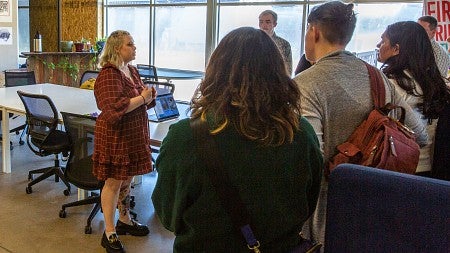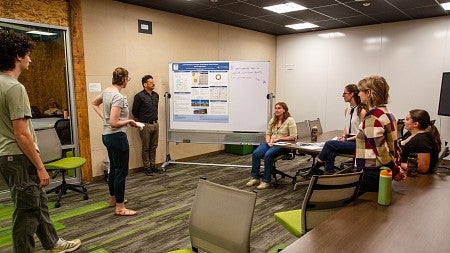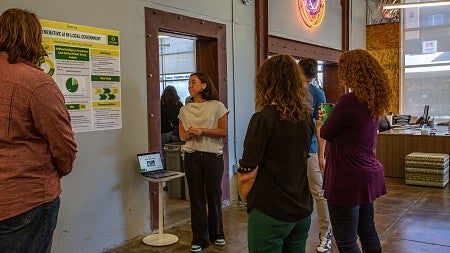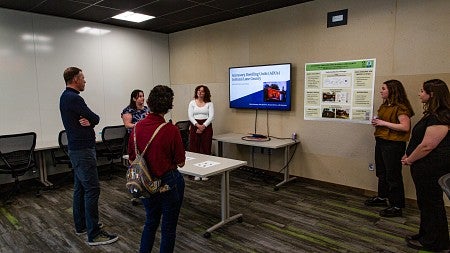
On a sunny day in March, small groups of people were eagerly knocking on a locked door in the heart of downtown Eugene on Olive Street. The groups were an even mix of public officials, community members, and School of Planning, Public Policy and Management (PPPM) faculty participating in the end-of-term review process for the popular PPPM class, “Real World Lane County”. The students in the class spent all term working diligently with communities in winter to help address real-world problems with novel solutions. PPPM is an expert in providing communities with resources and capacity building and is a thought leader when it comes to providing meaningful experiential, interdisciplinary educational experiences.
"I was really excited to do something hands-on that works with the community, works with the local government in the service of people," explained Madison Merwine, BArch. "What I'm really interested in architecture is how the built environment can serve the people and I think there is a lot of overlap between architecture and planning in that way. I love this class for [our] ability to work with planners and city officials, to learn how to communicate in a professional manner, and to do something that [would] make an impact on our community members in Eugene."
This term’s classes featured five unique projects and presentations. Each group presented their findings with aplomb and passion. Whether talking about the use of artificial intelligence, the creation of a new Parks and Recreation department, or the renovation of a particular government building, each student group was professional, informative, and energetic. As the attendees rotated from project to project asking questions and listening to presentations, each student group would reset their well-rehearsed presentation and regale attendees with a riveting tale of their project, partner, problem, and their proposed solution or recommendation.

"I took PPPM 410 this term to get to the implementation side of my major," said Ellie White, PPPM '24. "I [felt] like I had a strong theoretical foundation from my first three years of classes and I was ready to move into the [practice] phase of my education and to prepare myself for my post-graduate career and job search. I was really glad I took this class because I was able to shape the scope of my project, not just be given an assignment and a rubric [...] but to make something based on the values that I hold, the education that I thought was really important, and to share it with a community partner who was able to act as a networking opportunity and partner [throughout this process]. I'd definitely recommend this class!"
Real World Lane County is just one of the ways that PPPM prepares its students for entry into the workforce. PPPM has expertise and a long history with service-learning education since the beginning of its inception at the University of Oregon. Whether it is RARE, IPRE, or SCYP, PPPM has many different programs, in addition to its classes, that can offer students a chance to learn real-world skills and experience while also positively impacting local communities from the security of a classroom. This commitment to providing a service-based education stems from the very beginnings of PPPM’s history, thanks to the founding leader, David Povey. Povey tragically passed in 2023 but his influence is felt throughout PPPM.

“David was the most unusual academic I ever met,” explained Bob Parker, co-director of DSGN’s Institute for Policy Research and Engagement (IPRE) and longtime collaborator and mentee of Povey. “He was entrepreneurial in his approach and was at least two decades ahead of academia with his ideas concerning the relationship between academia and the community. David firmly believed that we should be bridging the gap between communities and higher education.”
Real World Lane County is just one of a multitude of ways that PPPM bridges the gap between communities and higher education. Every year, the community partners are dazzled and excited for the final presentation day, where plenty of individuals congregate, explore, and network with students. Oftentimes the partnerships from this class lead to internships or other opportunities, as groups look to build their capacity with the help of individuals who might have already analyzed their unique problems and provided solutions.
“Our undergraduates are great at offering novel solutions for our partners,” explained School Director and Associate Professor, Ben Clark. “They are passionate problem solvers and are capable of helping a variety of communities and governments thanks to the resources and support of the University of Oregon, specifically the School of Planning, Public Policy and Management. Our students are uniquely positioned to help thanks to an equal blend of passion, faculty experience, and resource development from the university. We find that opportunities develop further after our final presentations and many governments and communities come back for additional projects.”

Experiential education is more than a buzzword at the University of Oregon, it is a major educational tool, used expertly by the PPPM to create unique learning opportunities for its students, many of which are learning unique and pertinent skills that will help put them ahead of other graduates, thanks to the classroom experience.
“When you take an experiential learning course with the school, students are learning more than theory, they are picking up real-world skills and experiences, like how to run a public survey, how to process and analyze data, or how to pull together presentation materials for the public,” said Clark. “Experiencing these events now, uniquely prepares our students for entering the workforce. Any one of our students can hit the ground running, thanks to our expertise in and offering of experiential education. You really can’t learn these things any other way.”
